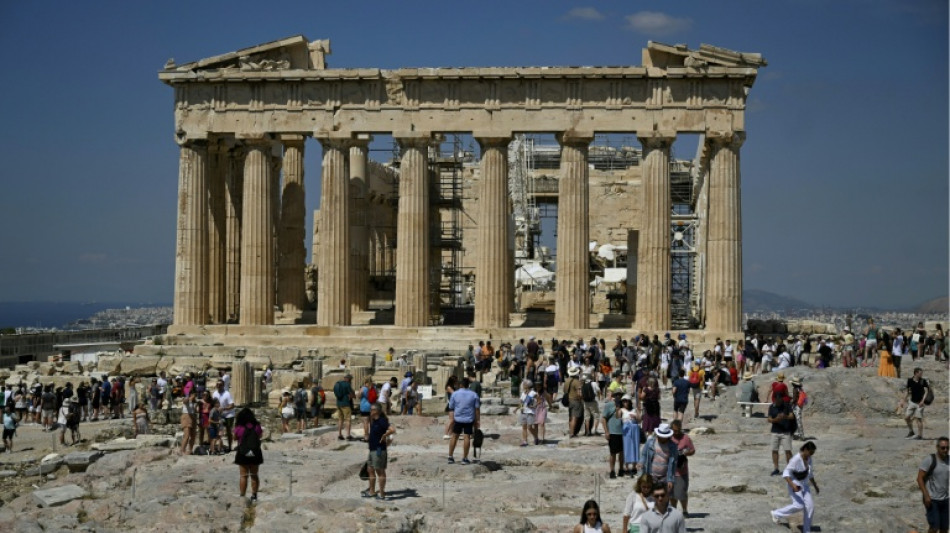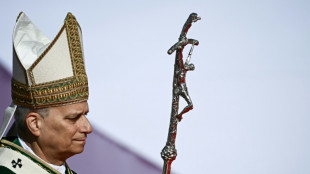
| SCU | 0% | 12.72 | $ | |
| CMSC | 0.09% | 22.87 | $ | |
| CMSD | 0.34% | 23.35 | $ | |
| BCC | -0.55% | 83.35 | $ | |
| RIO | -0.2% | 59.65 | $ | |
| BCE | 1.02% | 23.57 | $ | |
| NGG | 1.99% | 71.82 | $ | |
| GSK | 1.09% | 37.56 | $ | |
| AZN | 1.16% | 73.95 | $ | |
| RBGPF | 0% | 74.94 | $ | |
| SCS | -1.47% | 10.18 | $ | |
| BTI | 1.23% | 54.35 | $ | |
| RYCEF | 0.07% | 14.19 | $ | |
| JRI | -0.23% | 13.1 | $ | |
| RELX | -0.58% | 51.59 | $ | |
| VOD | 1.37% | 10.96 | $ | |
| BP | -1.26% | 31.75 | $ |

Tourism boom sparks backlash in historic heart of Athens
Surrounded by a hubbub of blaring music, restaurant terraces and rumbling suitcase wheels slaloming between overflowing litter bins, Giorgos Zafeiriou believes surging tourism has made his historic Athens neighbourhood unrecognisable.
The Greek capital's Plaka district "is threatened by overtourism", said Zafeiriou, who has lived there for more than three decades and leads its residents' association.
This year, 10 million people are expected to visit Athens, an increase of two million from 2024 which reflects the city's growing popularity as a tourist destination since the Covid-19 pandemic ended.
Despite its label as the cradle of Western civilisation, Athens was previously regarded as a mere stopping point between the airport and the port of Piraeus, from where tourists explore Greece's myriad of picturesque islands.
Nicknamed "the neighbourhood of the gods", Plaka is nestled below the ancient Acropolis hill, a world heritage site hosting the millennia-old Parthenon temple which welcomed almost 4.5 million visitors last year.
Plaka is now awash with tourists who navigate its warren of narrow streets lined with cafes, taverns, souvenir shops, small Byzantine churches and relics from Antiquity and the Ottoman era.
Plaka "is Europe's oldest neighbourhood which has been inhabited continuously since Antiquity", said Lydia Carras, head of the Ellet association working to preserve the environment and cultural heritage.
"We cannot see it lose its soul," she added.
- 'Saturated with tourists' -
Tourism is a pillar of the Greek economy, which endured years of painful austerity following the 2008 global financial crash and the ensuing eurozone debt crisis.
For souvenir shop seller Konstantinos Marinakis, "Greece is finally doing better thanks to the good health of tourism which allowed the economy to recover and create jobs."
But the flourishing sector has generated a backlash in Europe's most sought-after locations, with locals complaining of soaring housing prices and the impact on their neighbourhoods.
Protesters have targeted tourists with water pistols in Spain's Barcelona, while the Italian city of Venice has introduced a charge in a bid to control visitor numbers.
Mayor Haris Doukas told AFP with pride that Athens was now one of the world's 10 most-visited cities, but acknowledged "areas like Plaka which are saturated with tourists".
"We are not yet at the stage of Barcelona, but we must act before it is too late," he said.
An "intervention unit" for Plaka was recently created to enforce rules with the support of the police.
Any resident who spots a restaurant terrace encroaching on public space or cars parked on the pavement can report the offenders to this team.
"Between 1960 and 1980, Plaka was overwhelmed by discos and bouzoukias," and "many residents had already left," explained Carras, referring to clubs that play traditional Greek music.
A 1993 presidential decree shut the clubs, protected homes and specified the use of each building in the neighbourhood, with hotels only allowed on certain streets.
- Rules 'dodged' -
But "these rules have been dodged", with "entire houses converted into several apartments" advertised on short-term rental platforms, said Dimitris Melissas, a lawyer specialising in urban planning.
Plaka's population of 2,000 can be swamped by up to four times as many tourists in the summer, added Melissas, although no official statistics exist because the census measures Athens as a whole.
Representing Ellet, the lawyer has taken a case over the legality of 16 buildings converted entirely into seasonal rentals to the Council of State, Greece's top administrative court.
He argued they are actually hotel premises in disguise because they have receptions or serve breakfast on terraces. A decision, which could set an important legal precedent, is expected by the end of September.
The conservative government has banned new registrations of apartments on short-term rental platforms for at least a year in central Athens, where more than 12,000 seasonal lets existed in 2024, fuelling rent rises.
"But when I still read adverts in newspapers to invest in apartments that can be converted into Airbnbs, I doubt the effectiveness of this measure," said Melissas.
"The problem in Greece is not voting laws but enforcing them."
O.Meyer--JdB



